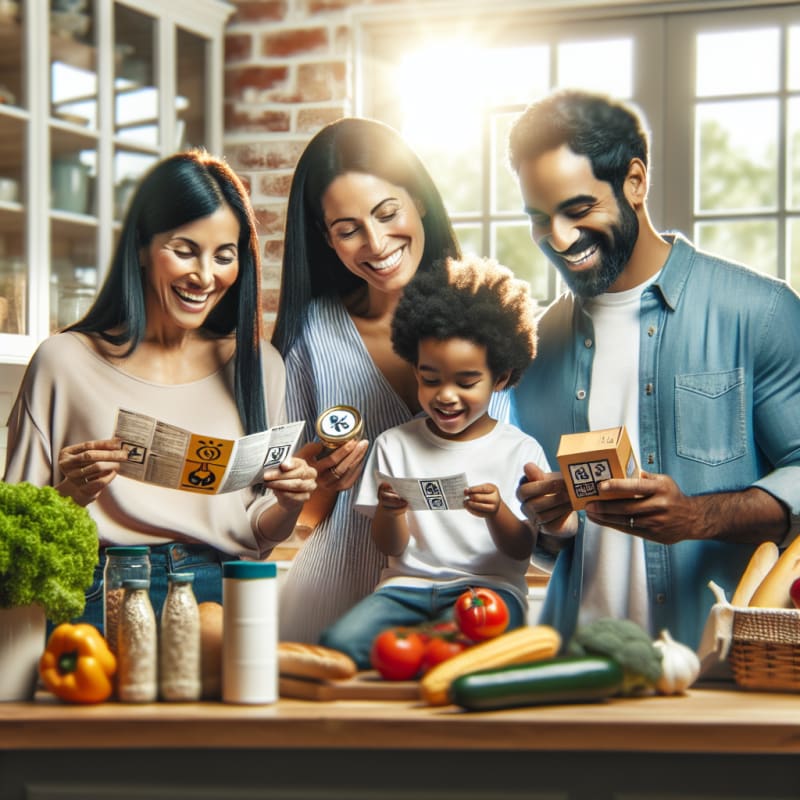How To Know If Food Contains Allergens?
Category: Generic Scanners
Picture this: You’re at a bustling supermarket, scanning ingredient lists like a detective, when your kid asks, “Can I have this pasta?” Suddenly, you remember last week’s mysterious rash after dinner. Was it the cheese? The wheat? Or something sneakier? If you’ve ever felt like Sherlock Holmes on aisle five, you’re not alone. Navigating food allergens isn’t just tricky—it’s a full-on adventure. But don’t worry, we’re here to help you crack the code!
Why Is It So Hard to Know If Food Contains Allergens?
In a world where “natural flavors” could mean anything from vanilla to shrimp extract, identifying allergens in food can feel like decoding ancient hieroglyphics. According to the FDA, over 32 million Americans have food allergies, and reactions range from mild discomfort to life-threatening anaphylaxis.[1] The European Food Safety Authority (EFSA) reports similar numbers in the EU.[2]
- Hidden ingredients in processed foods
- Different labeling laws across countries
- Confusing scientific names for common allergens
- Cross-contamination during manufacturing
So, how do you know if food contains allergens? Let’s break it down.
How to Read Ingredient Labels Like a Pro
Spotting Allergens: The Big Eight (and Beyond)
| Allergen | US Labeling | EU Labeling |
|---|---|---|
| Milk | Must be declared (FDA) | Must be declared (EFSA) |
| Eggs | Must be declared | Must be declared |
| Fish | Must be declared | Must be declared |
| Crustacean Shellfish | Must be declared | Must be declared |
| Tree Nuts | Must be declared | Must be declared |
| Peanuts | Must be declared | Must be declared |
| Wheat | Must be declared | Must be declared |
| Soybeans | Must be declared | Must be declared |
The FDA and EFSA require these major allergens to be listed clearly on packaging. But what about sesame, lupin, or mustard? The EU goes further, requiring additional allergens to be disclosed.[2] Always check for bolded ingredients, “may contain” statements, and scientific names (e.g., “casein” for milk protein).
US vs. EU: Ingredient Lists and Allergen Disclosure Laws
What’s the Difference?
- FDA (U.S.): Requires the Big Eight allergens to be listed in plain English. Sesame was added in 2023.[1]
- EFSA (EU): Mandates disclosure of 14 allergens, including celery, mustard, and lupin.[2]
- Labeling Format: EU often uses bold typeface; US uses “Contains:” statements.
- Precautionary Statements: “May contain traces of…” is more common in the EU.
So, if you’re traveling or buying imported foods, double-check the label and familiarize yourself with local laws!
How to Know If Food Contains Allergens? (Q&A Style)
Q: What’s the fastest way to check for allergens?
A: Scan the ingredient list for bolded or highlighted allergens. In the US, look for “Contains:” statements. In the EU, check for bold text and extra allergens. When in doubt, use a scanner app!
Q: What if I can’t pronounce an ingredient?
A: If “sodium caseinate” or “albumin” sound like spells from Harry Potter, look them up or use a scanner app. Many scientific names mask common allergens.
Q: Are “may contain” warnings legally required?
A: Not always. These are voluntary in the US, but more common and regulated in the EU. Treat them seriously if you have severe allergies.
Q: Can cross-contamination happen even if the allergen isn’t listed?
A: Yes! Manufacturing facilities often process multiple foods. Always check for “may contain traces of…” statements.
Tech to the Rescue: Food Scan Genius App
Let’s face it: Reading tiny labels in bad lighting is a recipe for disaster. Enter Food Scan Genius—your personal food detective. This app lets you scan barcodes or ingredient lists to instantly flag allergens, dietary preferences, and even vegan/vegetarian status.
- Scan products in seconds
- Get instant alerts for allergens or dietary restrictions
- Works for US and EU labeling standards
- Perfect for parents, travelers, and anyone with food sensitivities
User Testimonial: “My daughter’s nut allergy made grocery shopping stressful. With Food Scan Genius, I just scan the box and get a clear answer—no more guessing! It’s a lifesaver for our family.” —Maria, Boston
Ready to make food shopping safe and simple? Download Food Scan Genius and scan your way to allergen-free meals!
Recent News: Allergen Awareness on the Rise
- Sesame Allergy Gets FDA Attention (New York Times, Dec 2023)
- EU Expands Allergen Labeling Laws (BBC News, Nov 2023)
- Food Allergy Labeling: What You Need to Know (CNN Health, Mar 2024)
These stories highlight the growing importance of clear allergen labeling—and the need for smart tools to help consumers stay safe.
Tips for Staying Safe: The Allergy-Proof Shopping List
- Always read ingredient lists—even for familiar brands
- Look for “Contains:” or bolded allergens
- Use scanner apps like Food Scan Genius for instant checks
- Ask manufacturers about cross-contamination risks
- Stay updated on new allergens and labeling laws
Scientific Sources & Further Reading
- FDA: Food Allergies & Labeling
- EFSA: Food Allergens in Europe
- PubMed: Food Allergen Labeling and Consumer Safety
Frequently Asked Questions
- How do I know if a packaged food contains allergens?
- Check the ingredient list for bolded or highlighted allergens and look for “Contains:” statements. Use Food Scan Genius for instant scanning.
- Are allergen labeling laws the same in the US and EU?
- No, the EU requires disclosure of more allergens and uses bold typeface, while the US uses “Contains:” statements.
- Can I trust “may contain” warnings?
- These warnings indicate possible cross-contamination. If you have severe allergies, avoid products with these statements.
- What’s the best app for scanning food allergens?
- Food Scan Genius is highly recommended for its accuracy and ease of use. Download here.
Conclusion: Solving the Allergen Mystery
Remember our supermarket sleuth from the start? With a little know-how and the right tech, you can turn food shopping from a guessing game into a safe, stress-free experience. Understanding ingredient lists, knowing the laws, and using Food Scan Genius means no more mysterious rashes, no more panic, and a lot more peace of mind.
Next time your child asks, “Can I have this pasta?” you’ll scan, check, and say, “Absolutely!”—with confidence and a smile.
Stay informed, stay safe, and let technology be your foodie sidekick.





